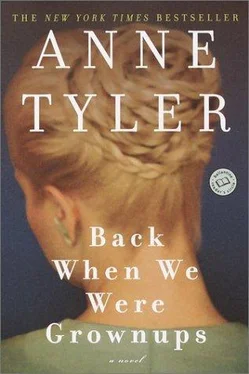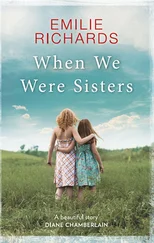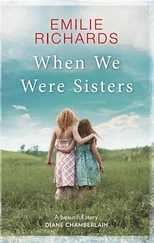Lateesha stopping prinking a diploma bow to ask Rebecca, “Real diamonds?”
“Well, according to Biddy they were.”
Lateesha (who was not so much younger than Biddy had been, come to think of it) gave a sigh of satisfaction.
“Meanwhile,” Rebecca said, “your grandpa was going back and forth with hot water and cloths, cleaning up the dining room. And finally he squatted down on the floor and started wiping my shoes off, right while I was standing there helping Biddy toss the salad.”
The most memorable of the five senses, she often felt, was the sense of touch. After all these years she could still feel the heat of that damp cloth soaking through to her toes, and Joe’s strong, sure dabbing motion that had reminded her of a mother cat industriously bathing her kittens. And she remembered how, once he’d finished, he rose and clasped her arm to lead her away, his warm fingers firmly pressing the bare skin above her elbow. “Where are you taking her?” Mother Davitch had cried in alarm. (For the kitchen was a disaster and that ham had so far been the only dish that had made it to the dining room.) But Joe called over his shoulder, “Don’t worry; we’ll be seeing her again.” Even while Rebecca was wondering at this, she had felt a surge of pleasure.
“We will be seeing you, won’t we?” he asked as they entered the rear parlor. “Are you in the Baltimore phone book?”
“Oh, I don’t live in Baltimore; I live in Macadam,” she told him. “I go to Macadam College.”
While she spoke she had looked elsewhere, trying to give the impression that she was offering this information with no particular purpose in mind. She watched the other guests from what felt like a great distance, noticing how flighty Amy seemed and how immature and tittering the girlfriends. (Joe Davitch, Rebecca surmised, was at least in his early thirties.) The fiancé—a loud-voiced, fraternity type — was expounding on possible stag-party sites. Paul Anka was singing “Diana” on the stereo, and the DJ sent Rebecca a grin and cocked his head significantly, although she didn’t know why.
“I get out toward Macadam fairly often,” Joe told her. “Maybe I could look you up.”
She let her eyes drift over to meet his.
He said, “Well, enjoy the party. Goodbye, Rebecca.”
Then he turned and went back to the kitchen.
Rebecca just stood there for a minute, alone as when she’d first come but with a huge difference. She felt that her crown of gold braids, her blue dress, even her splotched shoes were compellingly attractive. She observed the other guests from a position of… power, she would almost say.
“In a way, it was love at first sight,” she told the children.
Joey just said, “Huh,” but Lateesha got all wide-eyed and intense. “I’m going to have love at first sight, too,” she told Rebecca.
Rebecca said, “Well, I hope you do, dear heart.”
* * *
Min Foo was so late getting back from the doctor’s that Rebecca gave the children lunch — strawberry-jam-and-cream-cheese sandwiches. Poppy came downstairs and ate with them, although he spent most of the meal warning the children what to expect when they got old. “Step out of bed in the morning and your ankles refuse to bend,” he said. “Know what that feels like? Try it sometime. Try walking not bending your ankles. I clomp to the bathroom like Frankenstein’s monster. And then can’t pee. A simple thing like peeing that you would take for granted. Drip, drip, drip, it finally comes—”
“Ooh, gross!” Lateesha said, screwing up her face.
Poppy ignored her. “Then getting dressed,” he said. “Socks! Shoes! I have to have a special technique just for putting on my shoes. And Beck here has to tie them. It’s just like being a two-year-old. ‘Mom, will you tie my shoes, please?’”
The front door slammed against the closet, and Min Foo said, “Hello?”
“We’re in the kitchen,” Rebecca called.
Min Foo came down the passageway, rustling and jingling. “Hi, everybody,” she said. “Oh, you’re eating.” She gave off the clinical smell of vinyl-upholstered waiting rooms and isopropyl alcohol.
“How was your checkup?” Rebecca asked.
“Dr. Fielding says I’m too fat.”
“I’m sure he didn’t put it that way,” Rebecca said. “Won’t you have a sandwich?”
“Mom! I say I’m too fat and you offer me something to eat. Finish up, kids; we’re late for your play date.”
“Can I pour you some milk? Skim, I mean,” Rebecca said.
“No, thanks. We’d better hit the road.”
“Try driving a car when your ankles don’t bend,” Poppy piped up.
“What, Poppy?” Min Foo turned to Rebecca. “I was thinking about your dream,” she said.
“My dream,” Rebecca echoed. In the flurry of lunch, she had started to forget her dream. Now it came back to her, but with the boy more distant now, more of an other. “What about it?” she asked Min Foo.
“If you dreamed you had a son, not daughters, and if the son was blond, not dark…” Min Foo was shepherding the children toward the front of the house, so that Rebecca had to follow her. “Well, it seems to me,” she said, “that you were dreaming how things would be if you’d chosen a different fork in the road. You know what I mean? If you’d decided on some different kind of life than you have now.”
This struck Rebecca as so apt, and so immediately obvious where it hadn’t been before, that she stopped short. Oh, her girls could surprise her so, every now and then!
“Anyway,” Min Foo was saying, “thanks for keeping the children. Kids, tell Gram goodbye.”
Rebecca said, “Wait!” But then the telephone rang, and she had to turn back to the kitchen.
Poppy, who never answered the phone even when he was sitting right next to it, looked up at her from a spoonful of strawberry jam. Rebecca glared at him and lifted the receiver. “Hello,” she said.
“Mrs. Davitch?”
“Yes.”
“This is Katie Border’s mother. The graduation party?”
“Oh, yes.”
“Well, here’s the problem: our daughter didn’t graduate.”
“Didn’t graduate!”
“Can you believe it? The little minx: she never said a word. And whatever notification the school might have sent us, I guess she intercepted. So this morning I was hanging out her dress — the ceremony was set for three, her dad had arranged to come home early, both sets of grandparents had flown in over the weekend — when ‘Oh,’ she says, ‘did I mention? I flunked chemistry.’ Well, at first I didn’t catch on. I mean, I failed to understand that flunking chemistry would keep her from graduating. ‘Great, Katie,’ I told her. ‘What if you need to know chemistry later in life? If you’re, I don’t know, shopping for rose food or something?’ And she says, bold as you please…”
Rebecca started silently calculating her losses. The planning, the decorations, the deposits made to the disk jockey and the bartender. Alice Farmer, the cleanup maid, would demand to be paid in full regardless, although the waiter (Biddy’s son Dixon) might be more forgiving. The Borders would have to forfeit their own deposit, of course, but that didn’t cover everything. And Biddy would throw a fit. Most of her dishes were perishable and not the kind you could freeze. To say nothing of all her work, and the thought she’d given the menu.
“Well, isn’t it fortunate,” Rebecca told Mrs. Border, “that you’d already set up this party. It sends a message, don’t you think?”
“’Mom,’ she said to me… Message?”
“When your daughter must be feeling so disheartened, so discouraged with herself. But here’s this wonderful party to show her how much you love her.”
Читать дальше












